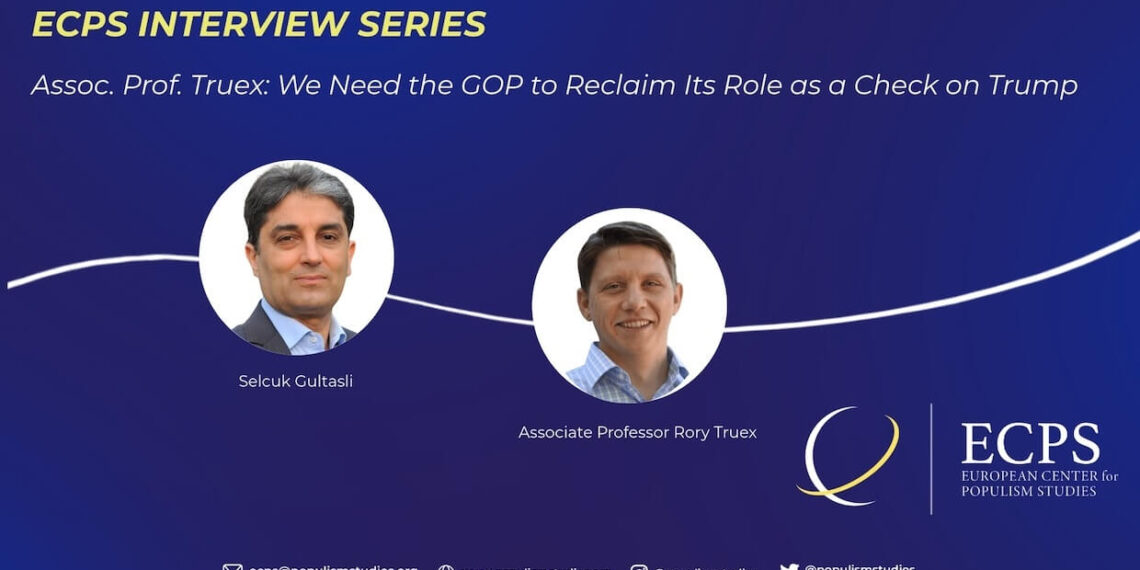“We Need the GOP to Reclaim Its Role as a Check on Trump,” argues Associate Professor Rory Truex of Princeton University in a wide-ranging interview with ECPS. He warns that the United States is “in the middle stages of democratic backsliding,” driven by Trump’s effort to “capture the referees” through loyalist appointments across the DOJ, FBI, and Department of Defense. Dr. Truex cautions that framing opponents as “enemies from within” is a classic precursor to authoritarian repression, even as recent mass protests—“the largest in American history”—underscore civic resilience. While electoral results in New Jersey, Virginia, California, and New York signal public fatigue with Trumpism, Dr. Truex maintains that meaningful reversal hinges on Republican elites: “We need the Republican Party to come back to its senses.”
Interview by Selcuk Gultasli
“We Need the GOP to Reclaim Its Role as a Check on Trump” — this stark warning from Associate Professor Rory Truex of Princeton University underscores the fragility of institutional constraints in the United States amid the continued rise of Trumpist politics. In an extended conversation with the European Center for Populism Studies (ECPS), Dr. Truex situates the contemporary US experience within a comparative framework, drawing on scholarship on democratic backsliding, authoritarian power consolidation, and the erosion of norms.
An expert on authoritarian governance—particularly in China— Dr. Truex argues that the United States is currently “in the middle stages of a process political scientists call democratic backsliding,” a trajectory in which formally democratic institutions are gradually transformed into mechanisms of asymmetric competition that systematically disadvantage opponents. While he stops short of declaring the US an autocracy, Dr. Truex emphasizes that Trump should be seen as “a proto-autocrat—someone with authoritarian ambitions whose ability to realize them remains uncertain.”
The most distinctive and dangerous dimension of the current moment, Dr. Truex suggests, is Trump’s systematic personalization of power—particularly his effort to sweep aside neutral bureaucratic oversight in favor of loyalists. Appointments at the DOJ, FBI, and Department of Defense reflect what Dr. Truex calls a classic strategy of “capturing the referees.” As he notes, “You really can’t have people around you who are going to stand up to you and check your power.” These dynamics have intensified under a second Trump administration.
The danger, however, is not limited to institutional subversion. Dr. Truex identifies a rhetorical shift that strikes at the heart of democratic culture: the demonization of political opposition. He warns that branding rivals “enemies from within” constitutes a foundational step toward authoritarian politics: “Anytime you see a phrase like ‘enemies from within’ or ‘enemy of the people,’ this is usually a precursor to some form of political violence or authoritarian crackdown.”While mass demonstrations in response—remarkably “the largest protest in American history”—have illustrated the resilience of civil society, the stakes remain high.
Against this backdrop, Dr. Truex underscores the critical role of Republican elites in determining the country’s democratic trajectory. The 2024 elections in New Jersey, Virginia, California, and New York (notably Zohran Mamdani’s victory) demonstrate, in his view, public “dissatisfaction with Trump and the Trump policy agenda.” These results also raise the possibility of a strategic recalibration within the GOP. As Dr. Truex puts it, the key question is “at what point [Republican members of Congress] will begin to try to distance themselves from Trump.” His appeal is unambiguous: “We need the Republican Party to come back to its senses. We need people to begin to check Trump.”
Whether such realignment will occur remains uncertain. But as Dr. Truex stresses, US democracy’s fate hinges not only on electoral outcomes but also on whether the institutional and normative guardrails that once constrained executive overreach can be rebuilt—and restored.


